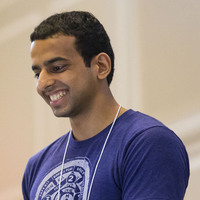Using Deep Learning to Understand & Answer Questions re Creative Language
Mohit Iyyer: In this talk, I explore how we can use deep learning to understand, generate, and answer questions about creative language.
Abstract: Creative language—the sort found in novels, film, and comics—contains a wide range of linguistic phenomena, from phrasal and sentential syntactic complexity to high-level discourse structures such as narrative and character arcs. In this talk, I explore how we can use deep learning to understand, generate, and answer questions about creative language. I begin by presenting deep neural network models for two tasks involving creative language understanding: 1) modeling dynamic relationships between fictional characters in novels, for which our models achieve higher interpretability and accuracy than existing work; and 2) predicting dialogue and artwork from comic book panels, in which we demonstrate that even state-of-the-art deep models struggle on problems that require commonsense reasoning. Next, I introduce deep models that outperform all but the best human players on quiz bowl, a trivia game that contains many questions about creative language. Shifting to ongoing work, I describe a neural language generation method that disentangles the content of a novel (i.e., the information or story it conveys) from the style in which it is written. Finally, I conclude by integrating my work on deep learning, creative language, and question answering into a future research plan to build conversational agents that are both engaging and useful.
Bio: Mohit Iyyer is a fifth year Ph.D. student in the Department of Computer Science at the University of Maryland, College Park, advised by Jordan Boyd-Graber and Hal Daumé III. His research interests lie at the intersection of deep learning and natural language processing. More specifically, he focuses on designing deep neural networks for both traditional NLP tasks (e.g., question answering, sentiment analysis) and new problems that involve understanding creative language. He has interned at MetaMind and Microsoft Research, and his research has won a best paper award at NAACL 2016 and a best demonstration award at NIPS 2015.
